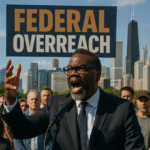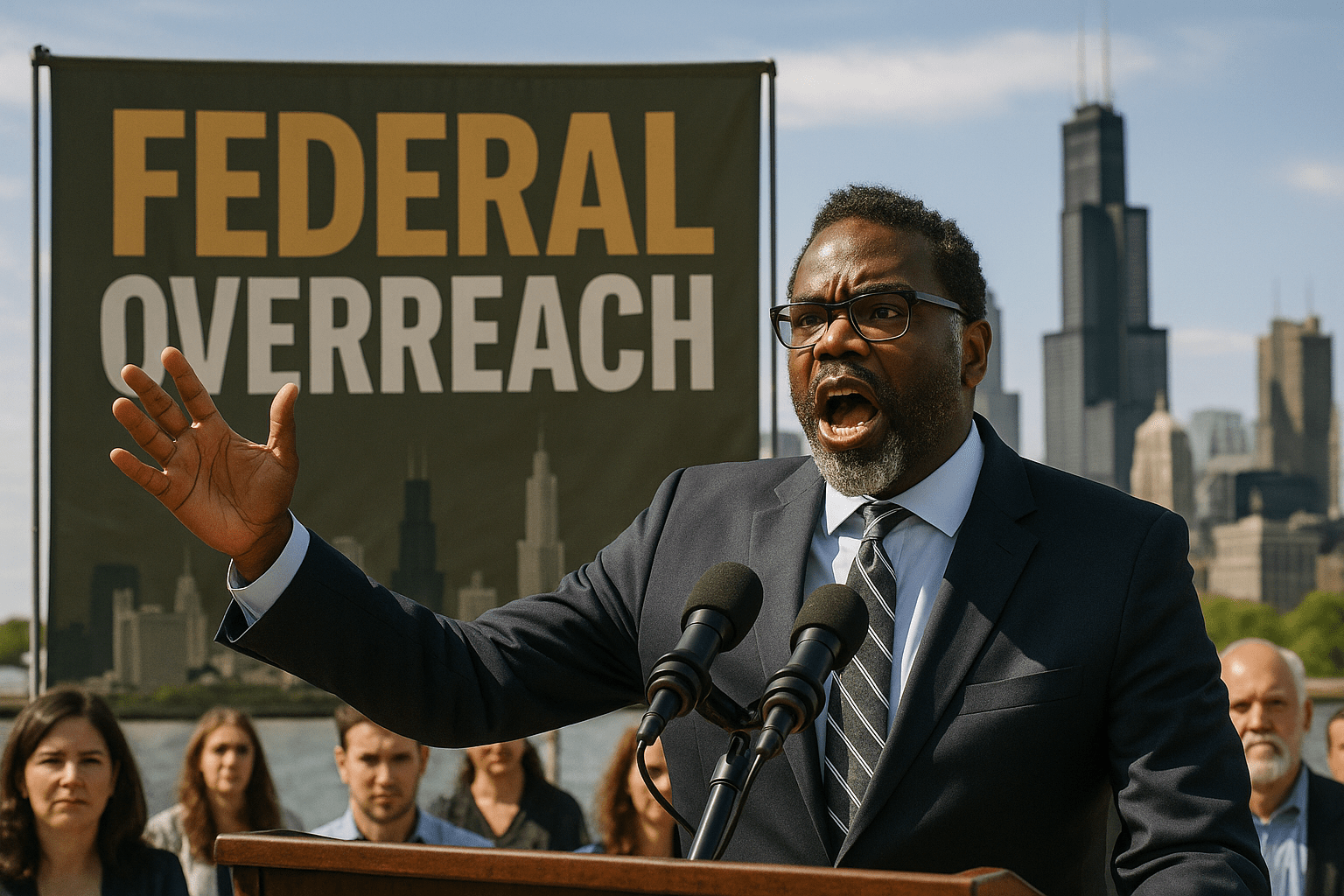

Chicago's Stance Against Federal Overreach
By Darius Spearman (africanelements)
Support African Elements at patreon.com/africanelements and hear recent news in a single playlist. Additionally, you can gain early access to ad-free video content.
Mayor Johnson Challenges Trump's National Guard Threats
Chicago Mayor Brandon Johnson is actively opposing President Donald Trump's threats to deploy the National Guard to Chicago. Mayor Johnson stated on Sunday that he is exploring legal avenues to prevent Trump from sending troops to Chicago (nbcnews.com). He emphasized that the National Guard is “not needed” and that their role is not to “occupy American cities” (nbcnews.com).
Trump has indicated that Chicago, along with other major U.S. cities with Democratic leadership, could be next for National Guard deployment, following a similar action in Washington, D.C. (reuters.com). Mayor Johnson's office released a statement indicating they are working with the Illinois governor and Cook County officials to evaluate all legal options to protect Chicago residents from what they consider “unconstitutional federal overreach” (dailygazette.com).
Understanding the National Guard's Role
The National Guard is a hybrid military entity that serves both state and federal interests (cnbc.com). It is typically called upon by state governors or U.S. presidents during periods of civil unrest or natural disasters to provide civilian aid and maintain order (britannica.com). While it can assist local law enforcement, its role is generally limited (britannica.com). It cannot legally engage in ordinary law enforcement activities without specific legal authorization like the Insurrection Act (dnronline.com).
The deployment of the National Guard typically falls under the authority of state governors (britannica.com). While the President can federalize the National Guard, doing so without the governor's consent, especially for domestic law enforcement, raises legal questions and potential violations of acts like the Posse Comitatus Act (time.com). The President's ability to activate troops without a state governor's order is not immediately clear (dnronline.com). Such actions are often seen as necessary to “address lawlessness” (cnbc.com).
Understanding Federal Overreach
Unconstitutional Federal Overreach: This term refers to the federal government exceeding its constitutional authority. It involves intervening in matters typically reserved for state or local control, especially when deploying military forces like the National Guard without state consent. This action can be seen as a violation of the balance of power between federal and state governments, potentially infringing on the Posse Comitatus Act.
Chicago's Declining Crime Rates
Mayor Johnson argues that crime rates in Chicago are declining, making the deployment of the National Guard unnecessary (nbcnews.com). Chicago police crime data from earlier this month shows that murders are down 31% from the same time last year (nbcnews.com). Shootings have dropped by 36%, and vehicle thefts are down 26% (nbcnews.com).
Johnson attributes these positive trends to the city's investments in people, including youth employment, mental health care services, building affordable homes, and ensuring the detective's bureau has necessary resources (nbcnews.com). Trump's “law and order” platform often singles out majority Democratic cities with large Black populations, such as Chicago, Baltimore, and Washington, when discussing urban crime (reuters.com).
Chicago Crime Reduction (Last Year)
Trump's “Law and Order” Approach
The “law and order” platform, as articulated by figures like Donald Trump, emphasizes strict enforcement of laws and a strong, visible police presence to combat crime. This rhetoric often targets urban areas, particularly those with large Black populations, such as Baltimore, Chicago, and Washington, portraying them as rampant with crime (reuters.com). The implication is that a more aggressive, federalized approach to policing is necessary to restore order, often leading to the deployment of federal agents and military forces like the National Guard (reuters.com).
This approach can raise concerns about racial dynamics and potential over-policing in minority communities. Hundreds of officers and agents from more than a dozen federal agencies have fanned out across Washington in recent days (reuters.com). This demonstrates the scale of federal intervention under this “law and order” framework.
D.C. Deployment as Precedent
Trump's recent actions in Washington, D.C., serve as a precedent for his potential deployment of federal forces in other cities. Trump authorized the deployment of National Guard troops to Washington, D.C., and signaled that Chicago and New York City would be next (nbcnews.com). On August 11, 2025, Trump announced he would take control of the D.C. police and deploy the National Guard in the capital, citing an “emergency” (reuters.com).
Trump's actions in D.C. represent a “rare expansion of presidential authority over local government” (time.com). He has also mentioned New York City, Baltimore, and Oakland as potential targets for federal police control (time.com). A federal trial began in San Francisco to determine if Trump violated U.S. law by deploying National Guard troops to Los Angeles in June without the approval of California Governor Gavin Newsom (reuters.com).
Washington D.C. Crime Trends (2025 vs. 2024)
Militarized Crackdown and its Implications
“Militarized crackdown” refers to the use of military-style tactics, equipment, and personnel in domestic law enforcement operations (time.com). This often occurs in response to civil unrest or perceived high crime rates. It can involve deploying armed National Guard troops, federal agents, and using military-grade vehicles or weaponry (reuters.com).
The term implies an aggressive, forceful approach that blurs the lines between military and civilian policing (dnronline.com). This can potentially lead to increased use of force and heightened tensions with the public (dnronline.com). For example, Trump's deployment of the National Guard in Washington, D.C., was a rare use of military forces on U.S. soil and a potential violation of the Posse Comitatus Act (time.com).
Illinois National Guard and the DNC
The Illinois National Guard was already on standby for the Democratic National Convention (DNC) in Chicago (blockclubchicago.org). However, their role is not for law enforcement or crowd control (blockclubchicago.org). Illinois Governor Pritzker confirmed that National Guard members were on standby for the DNC in Chicago (blockclubchicago.org).
Pritzker clarified that National Guard members are not trained for arrests or crowd control (blockclubchicago.org). Approximately 250 military police members would also be in the city if needed for the DNC (blockclubchicago.org). This distinction highlights the difference between providing support for a large event and engaging in direct law enforcement activities, which is the concern with Trump's proposed deployment.
ABOUT THE AUTHOR
Darius Spearman has been a professor of Black Studies at San Diego City College since 2007. He is the author of several books, including Between The Color Lines: A History of African Americans on the California Frontier Through 1890. You can visit Darius online at africanelements.org.
